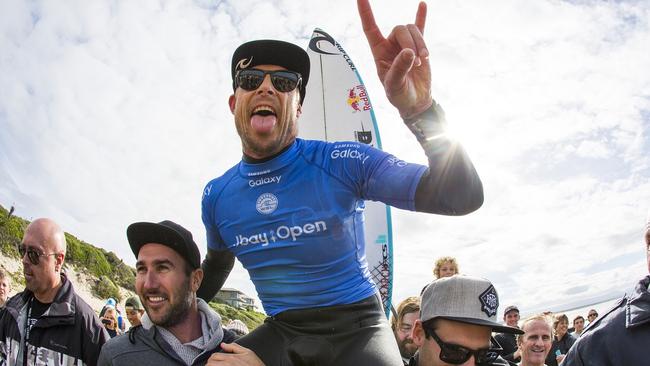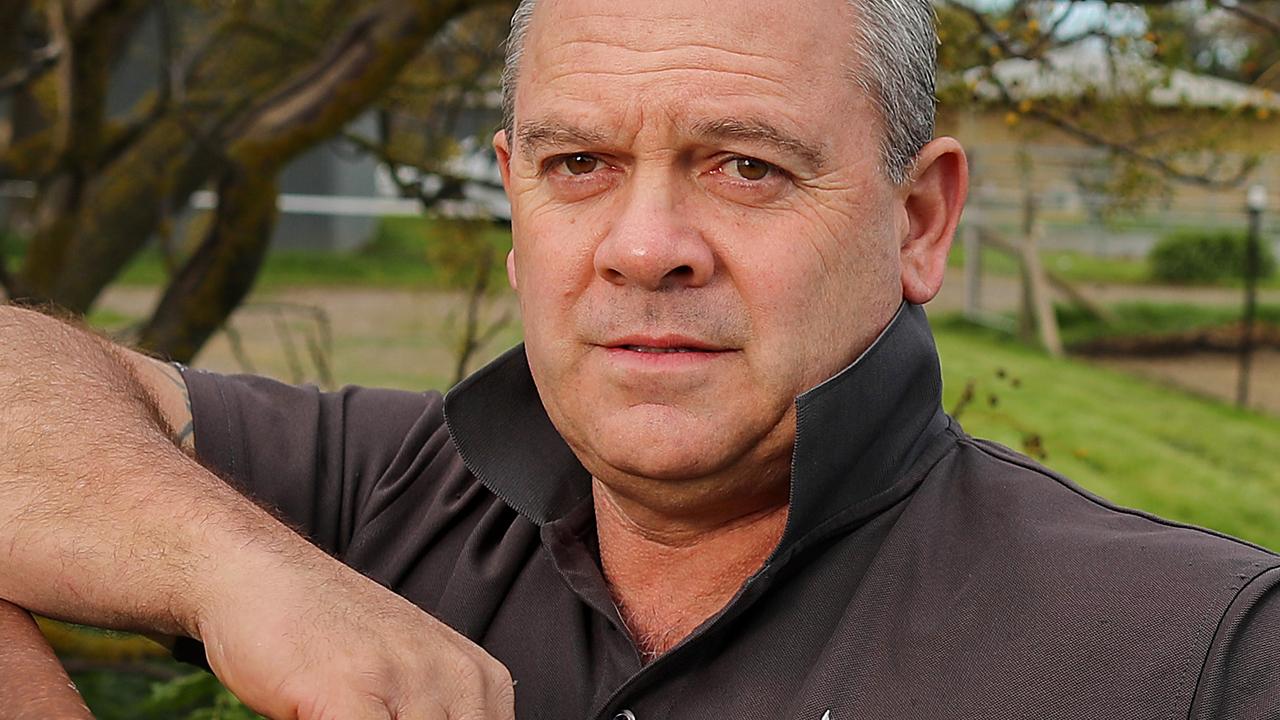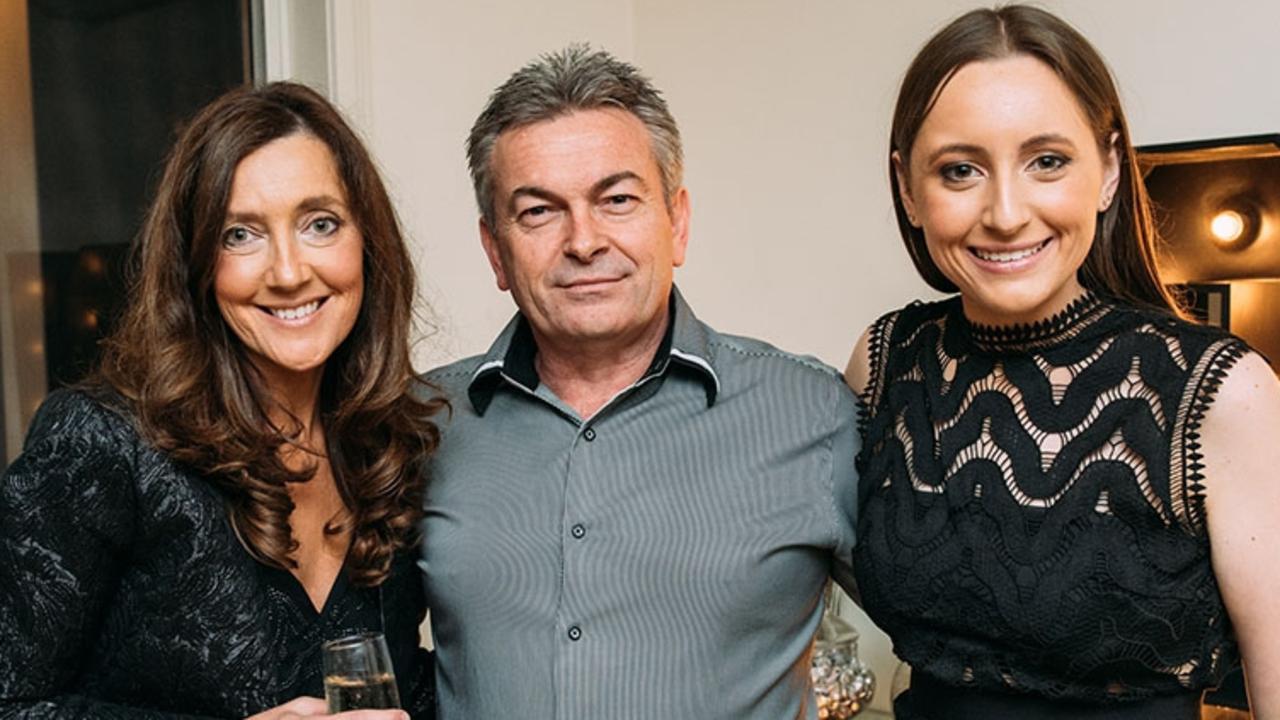Andrew Rule: Mick Fanning set to ride out surfing career on a high
HOW a fairytale and a nightmare combined to produce one of our most celebrated sporting heroes, writes Andrew Rule.
Andrew Rule
Don't miss out on the headlines from Andrew Rule. Followed categories will be added to My News.
IF God is a surfer, as some believe She is, then one of the sport’s all-time heroes should get to bookend his career by going out a winner at Bells Beach next week.
FANNING’S MUM: SHARK WILL BE HIS LEGACY
FANNING HOPING FOR FAREWELL VICTORY AT BELLS BEACH
A triumphant exit would be perfect symmetry because Bells is where he shouldered his way into world rankings as a raw-boned teenager 17 years ago.
That kid who shot the lights out with a wildcard entry was Mick Fanning. Since then the wheel has turned full circle: the prosperous businessman who’s now part of the surfing establishment is quitting the professional circuit after an extraordinary career.
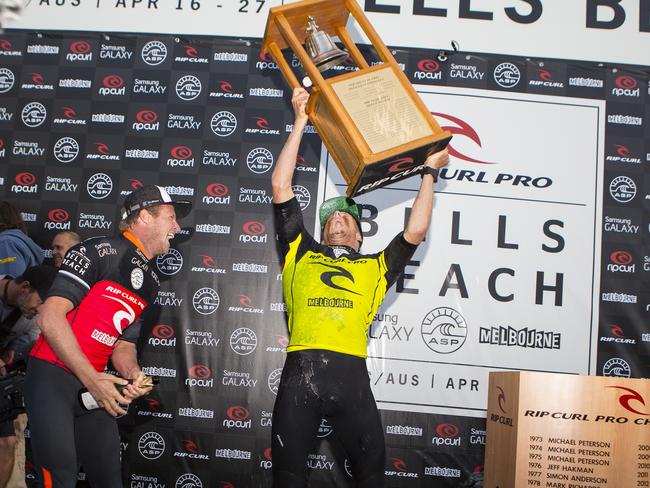
WORLD CHAMPION MICK FANNING ANNOUNCES RETIREMENT FROM PROFESSIONAL SURFING
MICK FANNING: THE TRAGIC LOSSES, MAGIC HIGHS AND THAT SHARK ATTACK
On the dais will be the famous bell-shaped trophy, the one Fanning has rung four times already as equal most-successful winner – level with the legendary American Kelly Slater – in the world’s longest-running professional surfing tournament, the 46th annual Rip Curl Pro.
But Fanning doesn’t have to win again to be the best story.
In sport, as in life, our heroes tend to be admired by the many who don’t know them, not so much by the few who do. Ask anyone who played with Bradman or worked for Bob Hawke. Ask Keith Miller’s family.
But in surfing, the consensus is that Fanning is as good a bloke as he is a surfer. He is liked up close, as well as admired from afar.
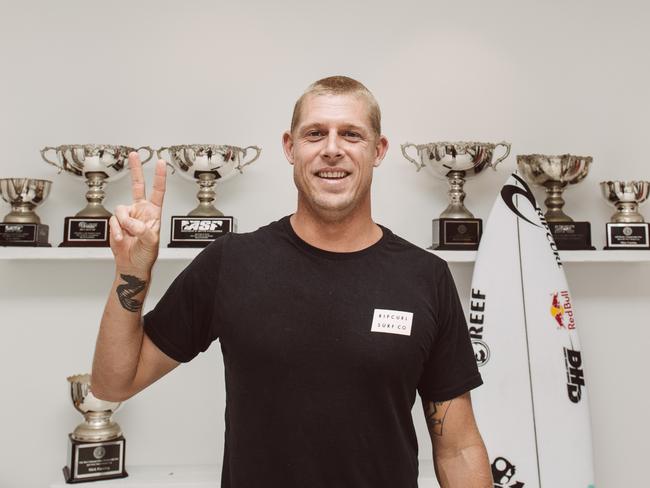
At 36, the triple world champion they call White Lightning transcends the sport at which he excels, and few sports stars manage that. That aura can’t be bought, only earned.
So when Fanning announced last month he’s quitting the professional circuit after competing at Bells Beach at Easter — win, lose or draw — it was like hearing that a Cathy Freeman or a Shane Warne was stepping down. No surprise but still a jolt.
“The tour has given me so much but I need a fresh challenge,” Fanning told his fans. “I still love the game but can’t find the motivation required to compete for world titles any more.”
Of course, retirement is relative. Competition aside, the retired version of Fanning is not going to seem so much different. This month he’s busy fine-tuning that rugged body so he finishes with a bang rather than a whimper. And he has to look after Fanning Inc.
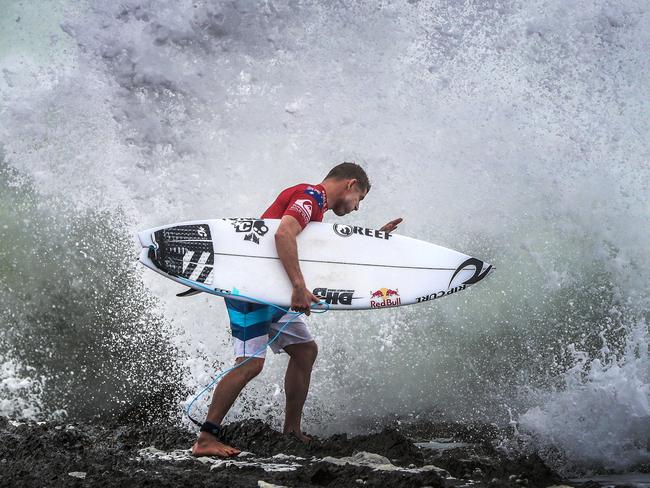
Top of a long list of interests is his beer venture, Balter Brewing, in partnership with surfing mates and James Packer’s “frenemy” David Gyngell, former Channel Nine chief. Then there is the roll call of sponsors still banking on the Fanning brand.
The thing that sponsors love about gun surfers is that even if they retire from the pro circuit, they never give up riding waves. They would never have started surfing if they weren’t hooked on it, meaning Fanning will still be chasing the best waves somewhere in the world — but purely for fun, not for the scorecard. This is how it goes for those under its spell.
No one surfs because ambitious parents dragged them out before dawn to be drilled in the pool, gymnasium or tennis court. Surfers are self-selecting and largely self-taught, not the product of some coaching regimen. To its disciples, surfing is more a way of life: part hobby, part meditation, part craft, part art form, almost a sort of cult religion rooted in the natural world.
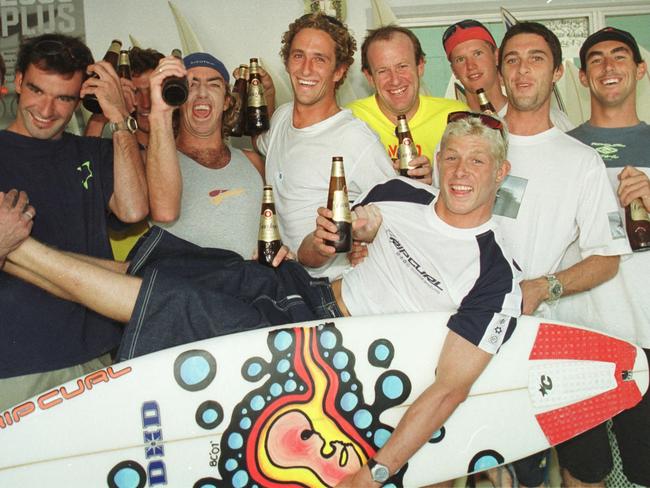
For the live-fast, die-young, hardcore who chase big waves, it has more in common with bullfighting than almost any other professional sport.
After the great jockey Roy Higgins gave up race riding, he never got on a horse again. He even gave up his daily round of golf for a long time because he associated it with walking off weight as part of his 30-year sweat and starvation programme to stay in the saddle.
How many ex-Olympic swimmers miss being a slave to the black line on the bottom of the pool? They don’t. But they might well go surfing, which is as endlessly variable as the oceans, the weather and vast coastlines around the world from Alaska to Tasmania.
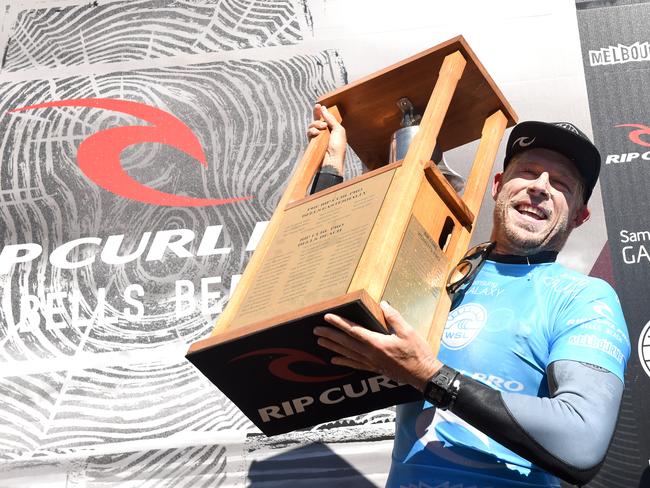
So, while Fanning might be giving up the demands of the competition circuit, he is hardly going to vanish. One reason is that he is so popular and is retiring so close to the top of his game.
Ask Australian surfers at any level about him and they enthuse like rock fans.
A respected Herald Sun police reporter who shall remain nameless would have trouble staying awake while listening to the Chief Commissioner explain crime statistics. But mention surfing and his tired eyes light up like those of a Labrador spotting a lamb chop. Mention Mick Fanning and he produces a “rare” surf book and goes straight to the page where “Mick” (note first-name terms) describes surfing with Kelly Slater at Bells Beach the week his one-time hero Michael Peterson died in 2012.
It’s easy to see what fans see in Fanning. The story of the life and hard times of the poor kid who beat adversity to become world champion is hard to resist because the odds against it were so ridiculously long.
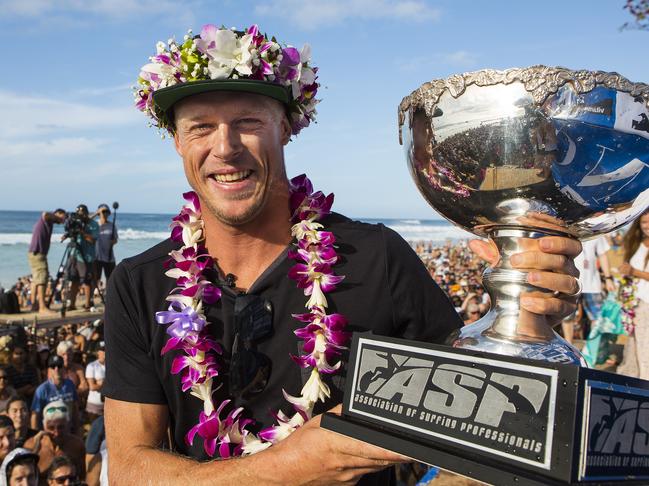
Michael Eugene Fanning and his four siblings were the children of a poor Irish immigrant couple who split when he was a toddler. The Irish are known for many things but not producing surfers. Especially when living in Penrith, well away from the coast, as Michael and the other Fanning kids did with their mum, Liz Osborne.
Fate is fickle. If Fanning’s mother had stayed in Penrith, 50km inland, his nervous energy, athletic ability and competitive spirit might have been channelled into anything but surfing. Who knows, he might have made a footballer, a runner or a tennis player or nothing at all.
But, after the marriage broke up, his mother, a nurse who later became his manager, was left with more children than money. Her solution was to move close to the beach, where a pair of boardshorts and a cheap board were all they would need.
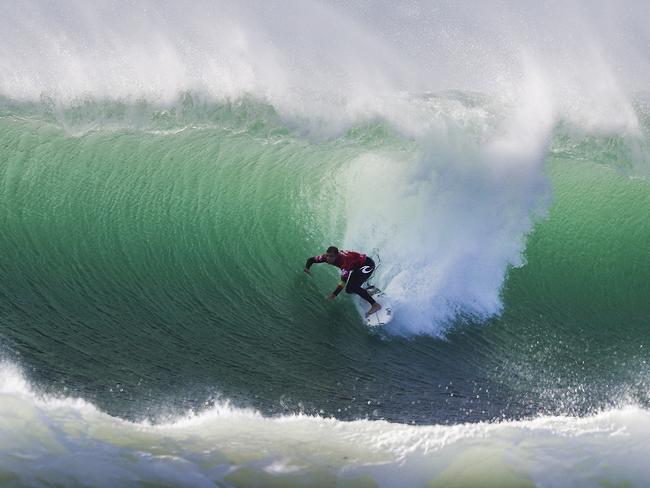
First, they went to Ballina. At the time, cross-country running and soccer appealed to young Mick more than the waves. He had success as a left midfielder with the Northern NSW soccer team, which won the country championships and NSW titles.
His nickname was the “Dynamo Kid” because he would run all the way through a game.
When the family moved to the Gold Coast in Mick’s first year of high school, they stopped to sign on at the local soccer club and meet up with surf brand Quiksilver, which was interested in sponsoring Mick’s older brother Sean.
“We went down on the wrong day and the club was closed. So, we just went surfing instead,” Fanning explained later.
“Sean did get sponsored, but so did I. I kept meaning to go back and sign up to that soccer club, but getting given free clothes from Quiksilver made me think, this is better than soccer after all.”
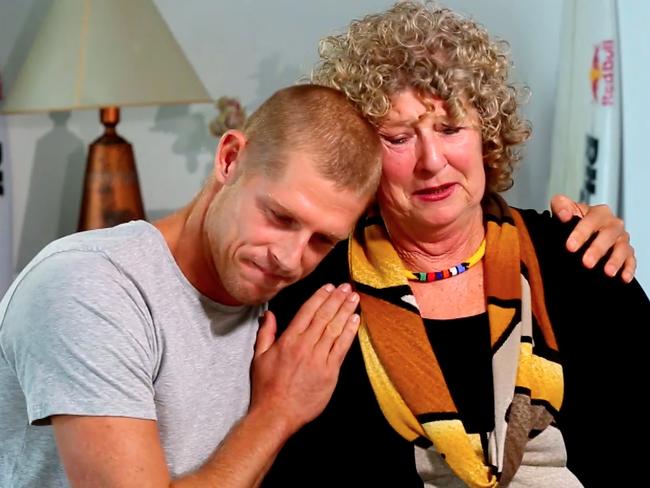
In his new home, he befriended surf-mad kids including Joel Parkinson and Dean Morrison. And he rubbed shoulders with the professional surfers of the day, such as Mark Occhilupo and Luke Egan.
“Us younger guys all surfed together and pushed ourselves,” Fanning would recall. “Drive for surfing comes from within, but growing up with a bunch of surf-hungry friends meant on the days you didn’t feel like it, you still went because you didn’t want to miss out on the fun with your mates.”
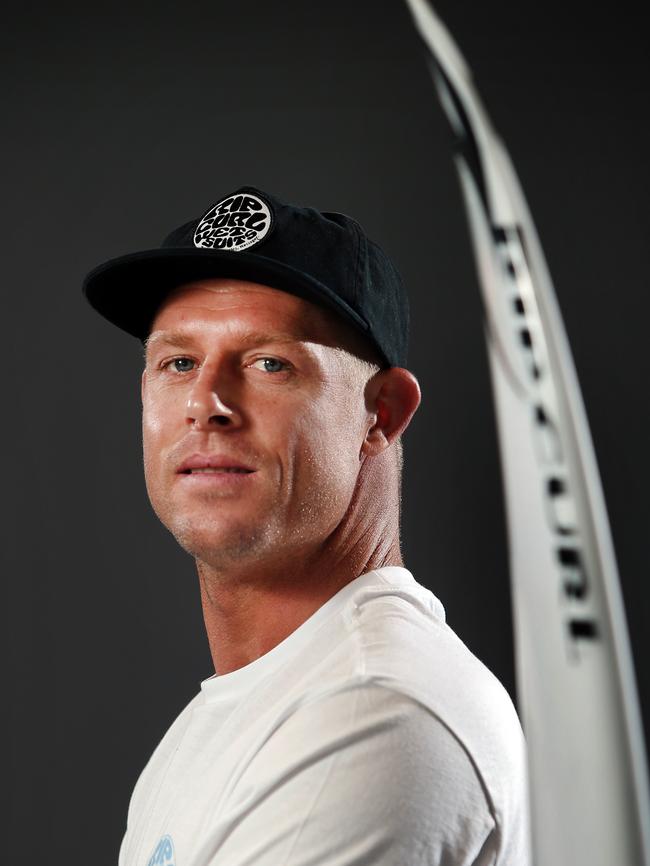
Part of the legend, of course, is that the fairytale moments are punctuated with nightmares. On a cold August night in 1998 his brother Sean and his mate Joel Green were killed in a car crash near Coolangatta. Mick, then 17, had been offered a ride in the same car but had chosen to walk.
He lived to do the hardest thing he’d ever do: tell his mother she’d lost her loved son. He stayed in his room for four days then went back to the sea to seek solace.
“Sean and I were going to do the pro tour together — that was our dream. So when I did make the tour, it made it that much more special to win an event or do well somewhere. A lot of the time, I feel like he’s with me when I travel,” he wrote later.
Tragedy hardened the steel in his soul. So did the fact he tore his hamstring from the bone in a wipe-out in Indonesia in 2004. It threatened to wreck his career but the focus he brought to fixing the injury made him stronger and better than he had been before.
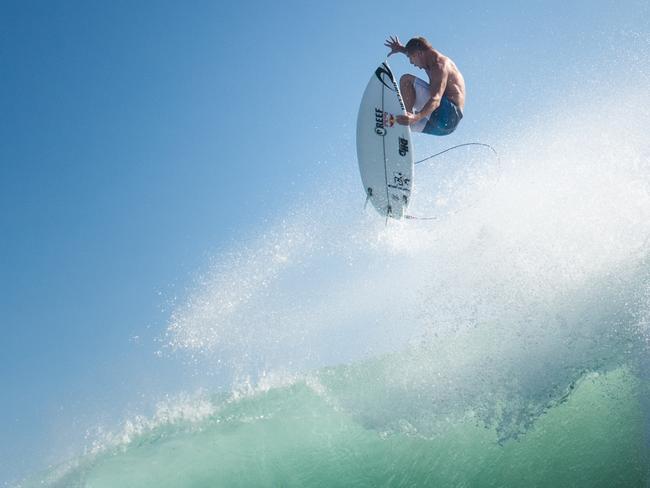
Wayne “Rabbit” Bartholomew, hero to an earlier generation of surfers, says Fanning “got right into the science of rehab and training and became an athlete, probably the fittest guy on tour … the benchmark for commitment and innovation.”
Fanning wanted to achieve the things his brother no longer would. He especially wanted to compete on level terms with Kelly Slater and he knew he had to be more professional than anyone else on the tour to do it. So the Aussie larrikin — the party-boy alter ego he calls “Eugene” — retired and the iron man was put together.
He clinched his first world title in 2007, his second in 2009. He claimed his third in 2013, snatching the win in the last seconds of the final from the great Slater. He wept with joy on the Hawaiian sand.
Two years later, he wept again at Pipeline and no wonder. It was the climax of a scarifying season.
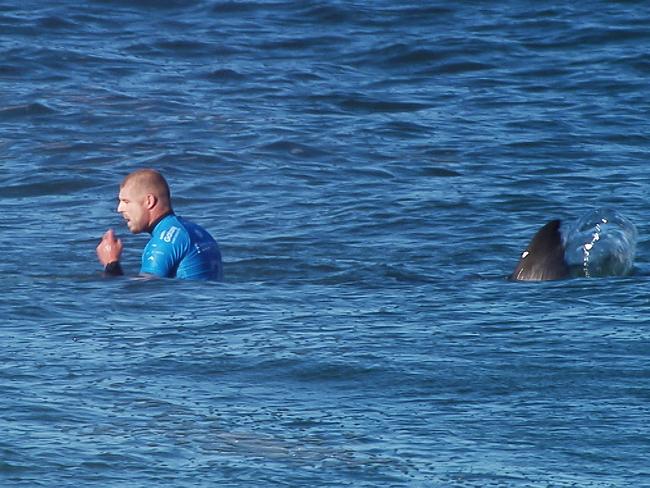
In July 2015, while surfing in the final of the Billabong Pro at Jeffreys Bay in South Africa, he was menaced by a great white shark that knocked him off his board and bit his leg rope. For a few seconds, as he disappeared behind a wave, everyone watching thought he might be dead or dying.
In one of the most touching displays in world sport, his opponent and fellow Queenslander Julian Wilson paddled towards him and the shark to help fight it off.
Fanning went back in the water within weeks. As he was preparing to battle for the championship in bone-breaking waves at Hawaii’s Pipeline, he got the news that his older brother, Peter, had died suddenly at home in Queensland.

Fanning continued surfing that day “because that’s what Pete would want” and made the semi-finals, only to lose narrowly to defending world champ Gabriel Medina.
He has since revealed he entertained the idea of retiring since his last world title in 2013. Now he has made the decision, he says, there is no coming back — even if he pulls the rabbit out of the hat and wins at Bells. If that happens, he says, there will be a hell of a party. “Eugene” might even attend.
Then Michael Eugene Fanning will walk into the sunset ready for the first day of the rest of his life ... carrying his board, looking for the next wave.


